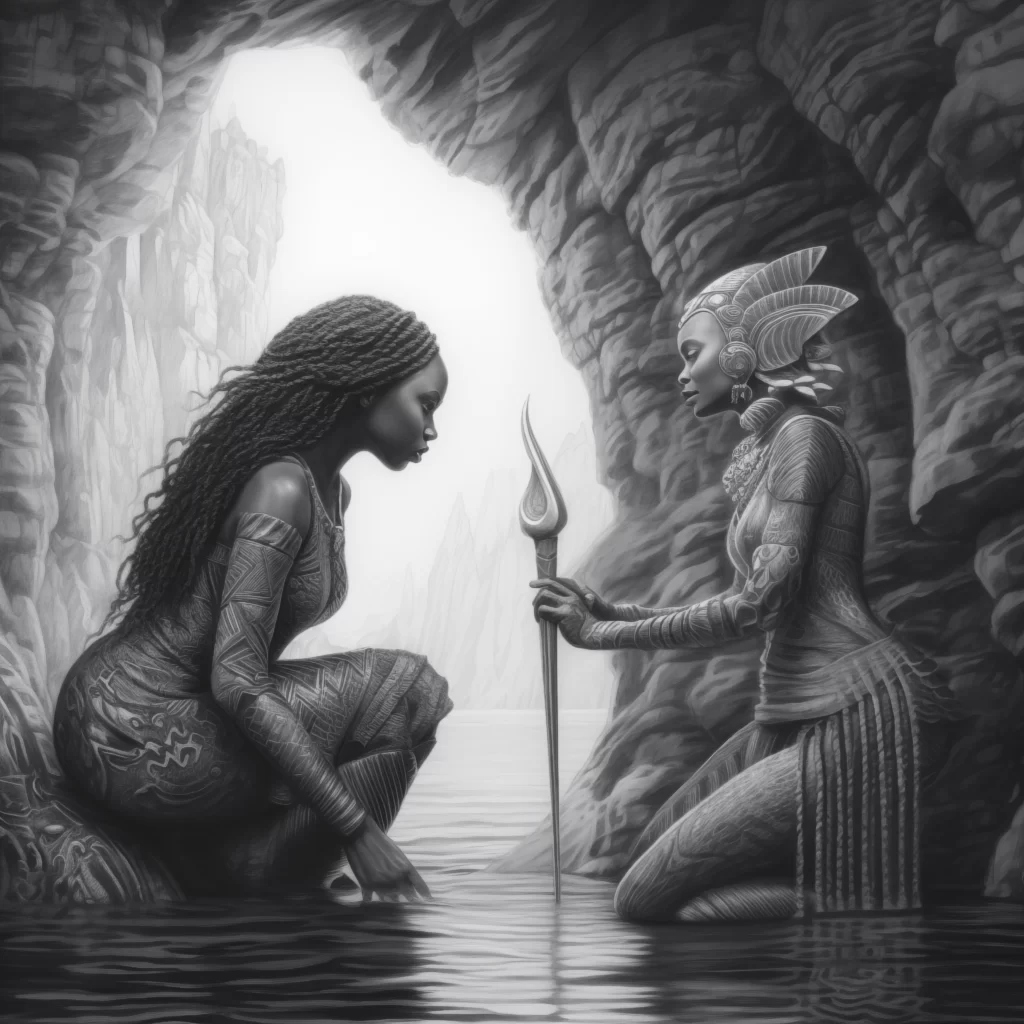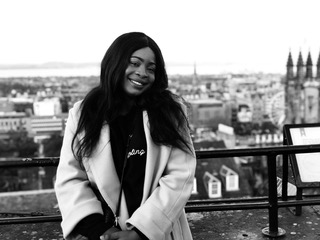Uzoma was born into a family of women with strong voices, rich and sonorous. It was a gift, passed down from one woman to the next. Her great, great, great-grandmother, sometime in the early years no one seems to remember, had been wandering deep in the forest of her hometown in southern Nigeria and found a cave that echoed humanlike sounds. She wondered what it was at first, who the voices belonged to. At first, she thought it to be lost people, calling for help. But when she searched and saw nothing, she thought they must have been ghosts looking for bodies to inhabit, filling the empty breeze and shaking trees. She stood still, lingered to listen and heard the sounds call to her. They held her soft fingers and drew her in. They whispered promises in her ear: ‘We will sing you heavenly melodies, infuse our gifts in your vocal cords, give our voice a home in the walls of your mouth and blunt edges of your teeth.’ They called to her, and she answered them.
Uzoma’s great great great-grandmother, the first woman, walked into the cave, her feet kissing the wet ground, as her toes slowly met the lake in the cave. Uzoma’s mother, Oluchi, tells her that the cave was dark as night, illuminated by the lake’s reflection on its walls. She tells her that the water had the colour of a puddle made of rain and wet clay. She tells her that rocks, hard as human skulls, floated on the surface. She tells her that the water’s opaqueness protects its secrets underneath from the naked human eye. She tells her these things, just as her own mother had told her.
The women in her family tell the story of the first woman accurately. How she was pulled down by a force the minute her lower body was submerged in the cold body of water. How she felt strong delicate hands hold her ankles tight, pulling her through wild torrents of thick water. How the force was so great it felt as though her head would detach from her body, yet she did not struggle to breathe. How she came out of a second body of water in a cave within the cave. How this second cave had its own light reflecting from its walls, a dull muddy brown, faintly resembling bronze and fading gold. How the colours made the stones that formed the cave look stained, unclean. The water in this cave was clear as a blue sky with cotton white cloud, it looked as though it could wash away the unrighteousness of sinful men, cleanse the rusting appearance of its home.
Uzoma’s mother gives her the account of how the first woman had seen the fish person. Fluke first, an eggshell white. The scales of her tail reflecting the colours of the walls of the cave and the clarity of the lake, having the appearance of a thousand precious stones. How in that moment, she knew that this cave and its outer home were made of and from her. How she wondered if it was created by the will of her being or by some sort of magic in the scales on her tail. Her skin, an array of deep brown shades, made the first woman curious of its tastes. Her waist occupying the depth of her stomach, her flesh widened at her hips, right where her tail began. Her chest bare and full, matching the skin of her body with nipples the colour of burnt sugar. How the first woman was stunned at the appearance of this fish person. Stunned at the beauty of her face. The women in Uzoma’s family say that the first woman believed her to be the most beautiful woman alive. The belief continues, present continuous tense. The fish person was no mortal. This was a fact. Uzoma’s mother speaks of her face, a perfect square shape, with high cheekbones. Her lips full and naturally lined with the brown of her skin. The first woman would come to realise that these lips, this mouth, held a thousand voices, the very same ones that brought her there.
The first woman saw this fish person in all her glory. Her full head of hair not styled or braided, dark, tangled. Her broad nose and ears garnished with pearls. Her arms, long and slender, bearing different inscriptions in languages she had never seen but somehow understood. It was the magic that came with the cave. The person. The first woman felt this fish person call her, beckoning her to come close. At first, she was afraid, unwilling to move, wanting to scream, and run away. But she found that she could do nothing. The first woman believed that this cave, this person, took her voice.
The tale speaks of how the fish person held the first-woman’s face in her hands. And how despite losing her voice in that cave, the first woman gained a new one, a better one from the fish person. How the first woman said the touch of the person’s hand on her face had the feel of water. How this person examined the structure of her face, looked deep into her eyes to see the person she was, kissed her cheek to determine the taste of the water that formed her. How the fish person put her left hand into the lake in the cave inside her cave, packed a hand full of water and placed it in her own mouth. How the first woman looked, unmoving, still in shock, confused, trying to determine whether she was dead or alive. How, after scooping the lake water into her mouth, the fish person held the first woman’s two cheeks, forced her lips apart, and poured the water down the first woman’s throat. How the first woman described it as the spring of living water. The only one there ever was. How this spring passed on one of the fish person’s many voices, to this lineage of women.
They told this story exactly as the first woman did. Never written. They intended to for it to stand the test of time. This forever gift and its tale.
*
She was easily given to love. Uzoma swore on the first woman’s grave and the 999 voices of the fish person that she had ‘found the love of her life’ at least 4 times a year, in a different man. It was most peculiar because she believed it each time. This was why the first woman never rolled in her grave in anguish. The girl believed in every love that she had. It was her faith. When she loved, she presented it as true and transparent. Her heart on a platter, body as consideration and her mother’s secret a lullaby. She presented her truth, the story of her and the women before. The passing of the voice, and the loss of it once done. She broke the rules, said things that were to be symbols of companionship in her life beneath and beyond the earth. The fish person was kind to her because of her naivety, merciful despite her wilful recklessness and thus sustained the gift.
Uzoma told her lovers of the duties that came with the gift. The security measures, the warnings, the offerings. What it should and shouldn’t be used for, how it should and shouldn’t be used, where and when. She left no stone unturned, no questions answered. Her heart desired the deepest intimacy—unchallenged, unrestricted, unguarded, and her secrets seemed to do all of this. They asked, and she answered. Educating them, begging them to understand and love her, regardless. Begging them to respect the rules that made it so.
When they asked why she whispered at night, she explained that she was tasked with the duty to protect the voice from the day her tongue was solid enough to call her name and the names of the women before her. ‘That is how we know the gift has settled in the far end of your throat. Ready to be spoken and sang with.’ She told them about spirits that knew of the fish woman and her cave, spirits that knew of the voices she had. How some of them had tried to find her in the first cave but rather got trapped in an endless tunnel, in search of a guiding light, walking tirelessly to an end that did not exist. She told them that some knew of her mother and mother’s mother. How they knew of the gift. How sometimes, they lurked the night hoping to catch it. ‘This is why I whisper at night…’ she says to them, ‘and why I absolutely cannot sing at night. If they hear me, they can hold my neck and call my voice from inside me.’
Most did not believe. They laughed straight at her face, called her a nutcase, said ‘no be mami-water be that?’ or ‘ah, you be ogbanje?’ and laughed louder. Some believed her and inquired further. They asked, ‘So what happens when it calls your voice?’ and ‘so you no go fit talk again?’ A few of them masked their fear with false belief and bravery. They dared her to sing, promised to protect her if anything happened to her, swore to use their holy books as swords against the spirits that be. Their comments carried heavy sarcasm, mockery. This was how she knew it was time to leave. When they asked her incessantly to use her voice for them at night, she knew it wasn’t love.
It wasn’t that Uzoma never sang for them. Every morning, her voice woke, and told each of them when the day was bright enough for living. When it was safe for their bodies to go into the world. They told her her voice sounded like what heaven looked like, pure and flawless. They said it called their spirits from sleep and helped them find reality. They told her it felt like coming home after work and laying on fresh sheets, drinking coffee made well and water the right temperature. Each man told her that sometimes, they felt her voice moving in their bodies, days after hearing her sing.
Sometimes, at night, she whispered songs into their ears to help them sleep and guide them to sweet dreams. She wasn’t allowed to do this, the whispering at night, sometimes going above the permitted octave to show her devotion to them. But she was desperate for love. Desperate for their acceptance. Desperate for them to stay.
She had seen what loneliness looked like on her mother. How it drew the life out of her. How this fate resigned her search for love because what was the point? How could you not speak to your lover freely when the world was asleep? How could you not call their name when they were inside you, reaching your very core? How could you not laugh because your heart recognised safety and embraced it? She wanted all these things. To be, and to love.
Somehow, Uzoma was given permission to do both things. In her breathing she was, and in her being she found love. In an unexpected turn, Uzoma found a lover whose feelings matched hers without guile. When they spoke, she thought of swallowing his voice and making it part of hers. When he looked at her, she felt herself a sight to behold, her reflection a wonder from his view. When he held her, she saw herself a child cradled by its mother, the warmth of his arms everlasting. How do you describe a touch, a holding, that feels better than safe? That mirrors a sanctuary.
He was bewildered by the history of her and her women. Respected it, locked it in his heart a second religion. When she woke him in the morning, he gave thanks to God for her first on his knees. When she tried to whisper sleeping songs in his ear, he kissed her and asked her to stop, because he feared for her loss. He worried about its effects. He worried because they had no reference points for solutions, should anything happen. He worried because, like him, he knew she wanted to give him something lasting, something that proved that this love could somehow be held.
Uzoma knew what her limits were. She had known them before she could carry her voice. She knew what was entirely permitted, where there were allowances and where there weren’t. So, the day her lover fell ill, she decided to use her voice to draw the impairment out of him, to make him whole again. This was one of its many wonders.

She joined him on their bed, where he lay, looking half-alive and half-dead. She felt the heat of his body before putting hers beside him. Felt the moisture on her skin before their bodies touched. Her heart ached, for him, for them. She knew the sickness wasn’t ordinary. Knew it came from somewhere. Maybe the women were reminding her that this was something she could not have, or the spirits trying to get her to do what was necessary. She felt insulted by their audacity. How could they think there was nothing she could give up to save him? How could they underestimate the power that existed in her because of their love? How did they not see that this force between them was heavier than all their forces combined?
She was thankful that he was too weak to move and speak. That he was too inside his pain to know what she planned to do. It was late, but it was also the only time her voice held the necessary power. Uzoma held her lover’s hands and whispered songs to him. As she sang, the heat in his body turned to moisture that evaporated and she felt coolness envelop him slowly. With each passing minute, she sang louder because it determined progress and ensured healing and completeness. She watched his pale lips come back to life, saw his veins come into view and felt his heart pump blood through his body. She watched him lift the door to his eyes slowly, and watch the colour transcend from red to pink to white, before seeing what she recognised as first shock, then regret. She saw his eyes fill up with tears, watched them fall as he realised with each passing second that she was losing her voice. She saw all the feelings on his face change to confusion because she smiled too brightly. She thought of how happy she would be to finally be rid of the responsibility of carrying the voice for the sake of love, and her body shook with inaudible laughter.
She watched him sit up, felt herself shaking and her face wet with tears, because she then realised she hadn’t finished the song, couldn’t finish it. She saw his lips spread apart, mouth ajar, her hands holding his hands, holding her face.
‘Uzoma, what have you done?’

